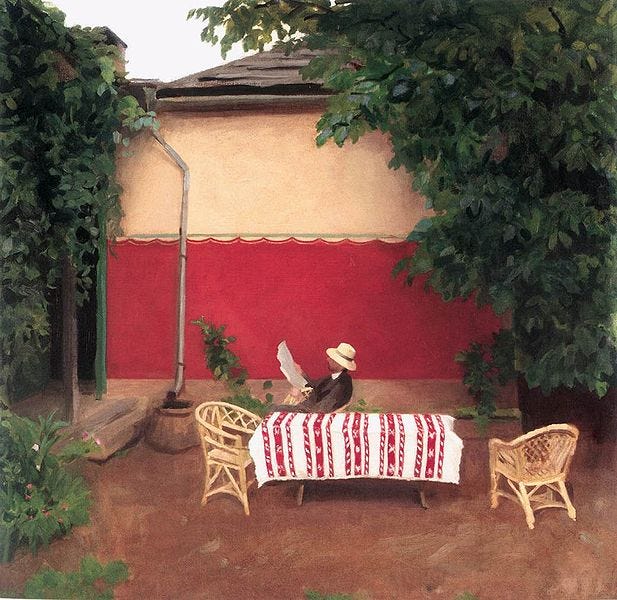English Teacher Weekly for June 27th
Welcome to English Teacher Weekly—your source for what’s worthwhile from the worlds of literature, education, Christian thought, and the humanities.
This late June edition is reserved for paid subscribers as a small token of thanks to those of you investing your energy and money in supporting this weird little project. You are the people that are keeping ETW sustainable. Much appreciated!
As always, the great majority of ETW will continue to be free to all subscribers. We’ll be back next week with a new edition.
Your Invitation to the Summer Sizzler
This summer marks the first official request for ETW reader contributions. We’re calling it the Summer Sizzler, and the goal is to gather up a small collection of musings upon the season. Anything from a tweet-length blurb to a small essay would be welcome! It’s a great way to celebrate the summer and share with our growing community.
Click here to see the assignment: feel free to bend the guidelines as much as you like. The deadline for submissions is July 4th. You can reply to this email (englishteacherweekly@gmail.com) if you have any questions or want to pitch an idea. I’d also love to know if you’re planning on taking part. Thanks!
Enjoy this week’s collection.
THIS WEEK’S COLLECTION
To Analyze, or Not to Analyze?
In a recent post for his Story Club,
answers a common question about the conflict between reading a story for pleasure versus an analytic understanding. Is analysis a matter of dissection, where you have to kill the creature being studied? Or is it a matter of cooking, reading the recipe to see how the ingredients form a delicious whole?I remember reading an art critic who said that that first split-second after our eye falls on a painting is all that matters, and I agree with this: the way we feel after a first read of a story is the whole game, and most stories in the world only get read once anyway.
When I’m writing, I want you to get blown away on your first reading, while having no thoughts about how I did it – I want you living that story with all of your senses, caring deeply, all caught up in it.
But later, if you come back to it curious about how it works, I think you’ll find evidence that….well, it works for certain reasons. And that’s what I’ve been working on: making it work.
Did I know everything I was doing, along those lines? No. Did I think it all up beforehand? God, no.
Did I, in the end “approve that message,” after many adjustive readings, and therefore, was the story exactly what I “intended,” even though I may not be aware of all the things it is going to do to a reader?
Yes.
Scenius vs. Genius
This recent post by
connects the idea of “scenius” to the culture we create in our classrooms. Scenius is a term coined by musician Brian Eno—his attempt to describe how creative communities are what inspire an individual’s talent to develop. Here’s Eno’s definition: “Scenius stands for the intelligence and the intuition of a whole cultural scene. It is the communal form of the concept of the genius.” The notion of the isolated artist creating original work while locked away in an attic is largely a myth.From Brake’s post titled “An Ecology of Talent”:
Scenius requires community and collaboration. Scenius cannot be created by any one individual. Despite making a good story, the greatest sources of creativity and imagination have never been from a lone genius. We know this. There are many examples: Silicon Valley, Ancient Athens, the Clapham Sect, Bell Labs, the MIT Media Lab, or the Florence Renaissance; the heights of human creativity are always a product of community.
If we know the power of scenius, we should design our educational experiences to cultivate it. If you listen to the chatter around educational technology using generative AI, it seems that universally accessible one-on-one tutoring is the holy grail. Individual tutoring might create genius, but it cannot foster scenius. Here are a few ideas I'm pondering as I think about double clicking on scenius in my own teaching:
Give students a voice
Strengthen the network effects
Build in public
His post goes on to elaborate on all three of these points, each vital to creating a classroom and school culture that fosters real thinking and creativity. It’s as important, if not more so, as it’s ever been.
The Death of the Mythical Method
Keep reading with a 7-day free trial
Subscribe to English Teacher Weekly to keep reading this post and get 7 days of free access to the full post archives.






